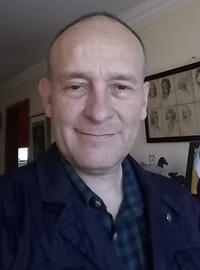What The Urantia Book Means to Me - Andrés Rodríguez
What The Urantia Book Means to Me - Andrés Rodríguez


By Andrés Rodríguez, Bogotá, Colombia
It is a curious thing that I found The Urantia Book in 1994, the same year I got married. A truly special year featuring the immense joy of having found and committed to the two dearest travel companions of my life’s journey!
The book caught my attention just with the Contents of the Book. At that time, I already perceived that I was encountering something stupendous, judging by the orderly cosmology that it revealed, and by the magnitude and diversity of the topics covered. Many of them have been objects of search and study throughout my life, ever since I read The Divine Comedy by Dante Alighieri at the age of 11.
After having tasted the waters of different springs of wisdom—varied sources like Christianity, Hinduism, esoterism, Rosicrucianism, Theosophy, and the sciences—I found that arriving at The Urantia Book was like discovering the treasure map, the Michelin Guide to Eternity, the instruction manual for how to put together the puzzle of history, science, philosophy, theology, religion, and spirituality.
Today, I have no doubt that The Urantia Book is a transcendental and authentic revelation and, as some have suggested, perhaps based on a statement by a Mighty Messenger in Paper 30, that it will be the guiding book for humanity for the next thousand years.
Having an engineering background, I was dazzled by the scientific parts. The text mostly dates to the mid-1930s, yet it depicted the organization of the universe into clusters and superclusters, while it took scientists until the 1970s to detect galactic movements different from the Hubble flow. The authors state the speed of light with greater precision than that known in the 1930s; that one of Jupiter's moons will be obliterated by the planet's tidal gravity; that our moon will be held back by the gravity of Urantia, and at that time, Earth's day will last 47 times longer than now. One could talk for hours about the scientific predictions in The Urantia Book, even some statements that might shed light on the popular issue of current climate change.
Despite my training in science, I also appreciate the book’s revelations in the field of history, such as the true date of the incarnation of our beloved sovereign; the true mission of Jesus; the siblings of Jesus (a forbidden subject for Catholics); the Lucifer Rebellion; the story of the two gardens; the wanderings of the Andite descendants; the story of the ancestry of Moses; and the supervised evolution of life on our planet and the human species.
While not well read in the field of cosmology, I had the opportunity to read Teilhard de Chardin, which is the most elaborate cosmology I am aware of, at least within Catholicism. But, as Dr. Meredith Sprunger suggested in an essay entitled “Universe Christology: A Transplanetary Theory,” what is needed is a spiritual cosmology that matches the vastness of the universe revealed by astronomy. To my mind, this Urantia cosmology is more exquisite and more elaborate than those of Teilhard de Chardin, Alfred North Whitehead, or Swedenborg. And it even includes an aspect of the heavenly Father's plan that we can understand right where we are now, with the universe being run by manifold hierarchies of authorities and their myriad assistants.
Finally, every time I reread the book, I find new truths, new expressions that we live in a universe of things and beings created and governed with love and wisdom. The universe allows us, the ascending mortals of time and space—along with many other orders of creatures—to harbor the hope and dream that one day, far away, we will be in the presence of the Universal Father. Even after that indescribable goal becomes our reality, new adventures and missions will await us in the expanses of outer space. And they will involve much more than playing the harp with a cherubim on some cloud for all eternity!
